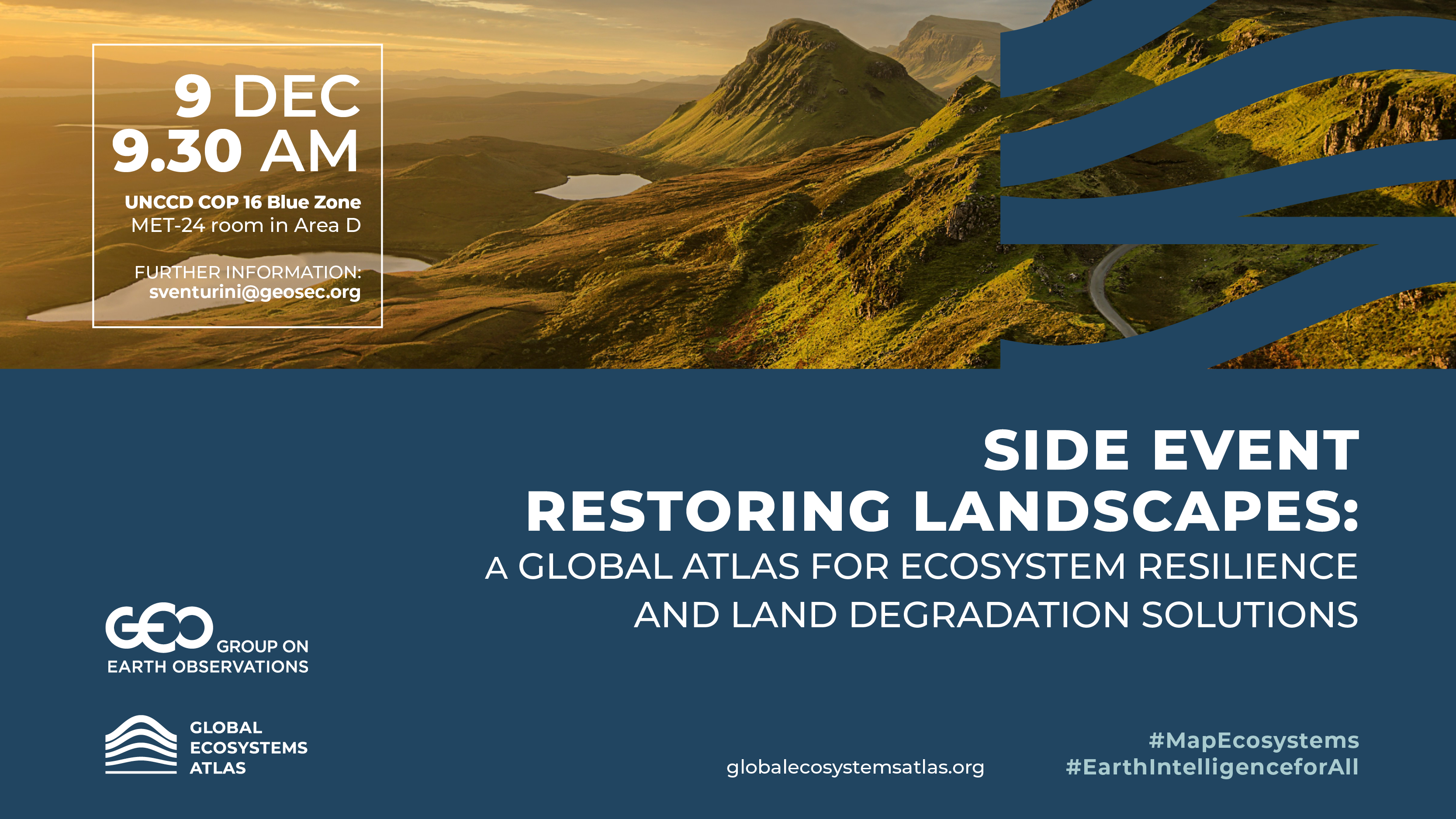Global Ecosystems Atlas Side Event
2024 UN Desertification Conference (COP16)
- Home/
- Events/
- 2024 UN Desertification C... /
- Global Ecosystems Atlas Side Event

As Parties to the United Nations Convention to Combat Desertification (UNCCD) work toward voluntary Land Degradation Neutrality (LDN) targets, the importance of robust data systems becomes paramount. LDN focuses on balancing losses in natural capital from land degradation with equivalent gains, ensuring no net loss. Achieving this requires a holistic view of ecosystems to optimize conservation, sustainable use, and restoration efforts spatially. To avoid biases—where one ecosystem is heavily degraded while another is significantly improved—it is critical to maintain ecological balance. Efforts must align with LDN principles and ensure neutrality is assessed consistently from local to global scales.
In this context, the Global Ecosystems Atlas becomes an invaluable resource. It is the first harmonised resource dedicated to mapping and monitoring all the world's ecosystems. Convened by the Group on Earth Observations (GEO) and unveiled at the 2024 United Nations Biodiversity Conference (CBD COP16) that took place from 21 October – 1 November 2024 in Cali, Colombia, the Atlas will serve as an essential tool to support the protection, restoration and sustainable management of ecosystems critical to addressing global environmental crises. The Atlas combines existing high-quality ecosystem maps with new maps created using the latest Earth observation technology, artificial intelligence, field data, and local expertise. Policymakers can use this tool to overlay maps of degraded and improved lands with corresponding ecosystem data, enabling precise assessments of gains and losses by ecosystem type at sub-national, national, and regional levels. This facilitates necessary adjustments to ensure that land management strategies are both effective and equitable.
At the Blue Zone side event, GEO will unveil the Global Ecosystems Atlas, a groundbreaking open-access tool for global ecosystem mapping and monitoring. The event includes a hands-on demonstration and insights from the UNCCD Secretariat, governments and technology partners on addressing data gaps and enabling informed decisions for land restoration and productivity, in particular in the Gulf region.
This side event will introduce the Global Ecosystems Atlas proof-of-concept for the first time in the Gulf region. The event will showcase how the Atlas can be used as a strategic resource to produce detailed, harmonized data and insights on ecosystem distribution and change, and ultimately support countries in achieving their LDN targets under the Convention.
Objectives of the side event:
- Showcase the Atlas's potential in addressing challenges unique to sustainable land management and restoration, while emphasizing the link between ecosystem services and food security, water management, and climate action.
- Demonstrate how the Atlas can streamline reporting across the Rio Conventions.
- Highlight the strategic importance of the Atlas for Gulf countries in promoting ecosystem resilience and supporting national and regional environmental initiatives.
- Promote the exchange of knowledge on ecosystem data, encouraging Gulf countries to use tools like the Atlas for shared learning and innovation.
- Emphasize the Atlas's scalability and future impact, outlining opportunities for expansion and benefits for future partners.
9 December
9:30-11:00
MET-24 Room, Area D, Blue Zone
Speakers
- Yana Gevorgyan, Director, GEO Secretariat/ Moderator
- H.E. Thoriq Ibrahim, Minister of Climate Change, Environment and Energy, Maldives
- Johns Muleso Kharika, Chief of Science, Technology and Innovation (STI) Unit, UNCCD Secretariat
- Khaled Abdullah Alabdulkader, CEO, National Center for Vegetation Cover Development and Combating Desertification (NCVC), Saudi Arabia
- Mark Otterlee, Senior Director of Engineering, Allen Institute for AI (Ai2)

